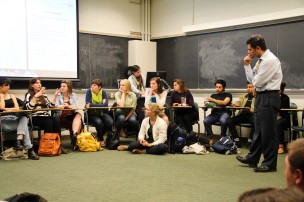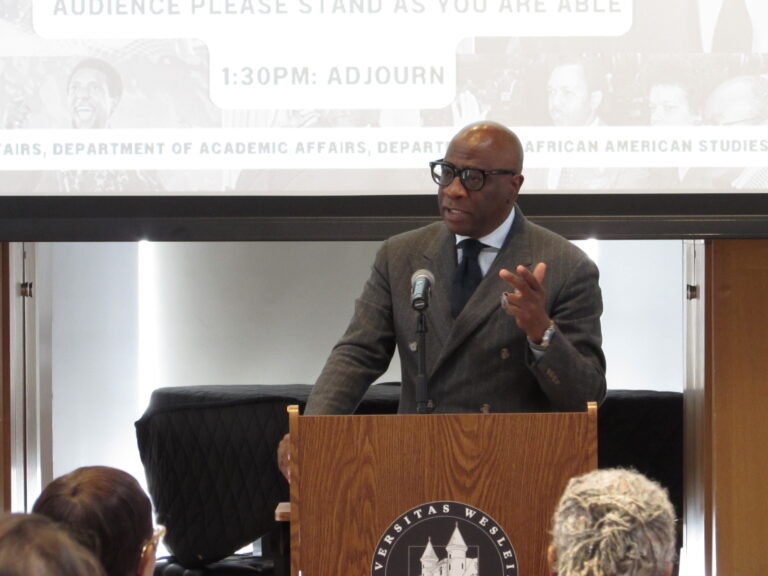Sexual Assault Forum Confronts Campus Issues

On Monday, April 21, over one hundred students, administrators, and faculty members gathered in Tischler Lecture Hall for a forum on sexual assault. The forum, organized by Jack Spira ’16, featured a diverse group of speakers, including Vice President for Student Affairs Michael Whaley, University Sexual Assault Resource Coordinator and Therapist Alysha Warren, Rabbi David Leipziger Teva, Vice President for Equity and Inclusion and Title IX Officer Antonio Farias, We Speak, We Stand President Willa Beckman ’15, and Sexual Assault Response Team (SART) intern Rachel Verner ’15.
At the onset, attendees were separated into smaller discussion groups that focused on Greek life on campus, bystander intervention, university judicial procedures, and sexual assault resources.
Spira spoke on the process for selecting the format and the topics of the forum.
“We decided to separate it out into three groups,” Spira said. “Obviously we talked about Greek life as one of the topics. But we also wanted to bring up two other topics that are important to people: survivor support and the reporting [and] judicial process. Ultimately, this format was chosen because it allowed for everyone to be in … small enough groups that everyone would feel comfortable enough talking. It allowed everyone to feel more like … a community.”
Farias, who moderated the section on University judicial procedures in regards to sexual assault, commented on the importance of involving more students in the discussion.
“If you were going to [Tischler Hall], which has stadium seating and potentially 120, 150 people in it, it’s hard for you to make a point unless you’re really adamant about it, which is really [only] five percent of the student body,” Farias said. “What’s always a concern for me is…the fuzzy middle: the 80 percent that is interested enough to show up, but they’re not really sure how to ask questions, or their voices get lost because people on the wings dominate conversation. So smaller spaces allow for that 80 percent to have a voice because they feel more comfortable [and] they can ask questions.”
The discussion-oriented format was meant to allow for a direct conversation between students and administrators immediately involved in various aspects of sexual assault awareness. Warren noted the importance of having this direct connection.
“Sexual violence impacts everyone in our community, and it requires a collective effort to identify a solution,” Warren wrote in an email to The Argus. “I also think it’s incredibly important that the people working on sexual violence administratively talk directly with students, and that they know who we are. I hope that if someone needs support or has ideas about outreach and education that they will feel more comfortable reaching out to me to talk after meeting me at the forum.”
Although the forum was being planned as early as Spring Recess, the event itself came on the heels of the Wesleyan Student Assembly (WSA)’s passage of Resolution 6.35, also known as Resolution B, titled “Recommended Housing Policy Changes Concerning Greek Organizations.” This resolution, with a vote of 14-12 with one abstention, called for fraternities on campus to become coeducational.
“From what I could tell, the conversation was remarkably not antagonistic,” Spira said. “That was one of the primary goals of the forum. Some of the past conversations that have happened have been marked by a lot of ‘us’ versus ‘them’ dichotomies. We wanted to avoid that if we could…. Ultimately, at the heart of this issue aren’t political decisions, and they’re not administrative changes…. At the heart of stopping assault and making us feel safe, and supporting survivors—that’s a cultural shift.”
Whaley, who moderated the discussion on Greek life, commented on his impressions of the forum’s dialogue.
“[T]here have been many conversations about these issues in recent weeks,” Whaley wrote in an email to The Argus. “One of the things I appreciated about the forum [was] that students with varying opinions were able to express their views, and it seemed that everyone else was listening and trying to understand the speaker’s perspective. These are certainly not easy conversations (for all sorts of reasons), but there are a lot of people who care deeply about the issues with which we’re wrestling. The forum included some new faces and voices—this was great in my view because I think more of our community needs to be involved in working on these issues.”
Alpha Epsilon Pi (AEPi) Social Justice Chair Jared Fineberg ’17, who attended the forum, commented on the effectiveness and importance of conversation regarding sexual assault on campus.
“As a member of Greek life on this campus, I recognize that the large role fraternities play in our school’s social scene comes with the responsibility to both listen and take action in response to the concerns held by the Wesleyan community,” Fineberg wrote in a message to The Argus. “Monday’s forum was a great opportunity to engage in productive dialogue on preventing sexual assault rather than debating the merits of a particular WSA resolution. The forum’s non-confrontational setting was an example of the best way to advance the conversation on campus about this issue.”
Although the forum continued the campus conversation on sexual assault awareness, Farias stressed that the issue is far from settled.
“There are no final thoughts,” Farias said. “…The beauty and the challenge of Title IX and anything having to doing with combating sexual assault on campus is that it is a constant conversation that’s based on actionable items. We can have these great conversations but they [also] have to have actionable and tangential outcomes.”







Leave a Reply